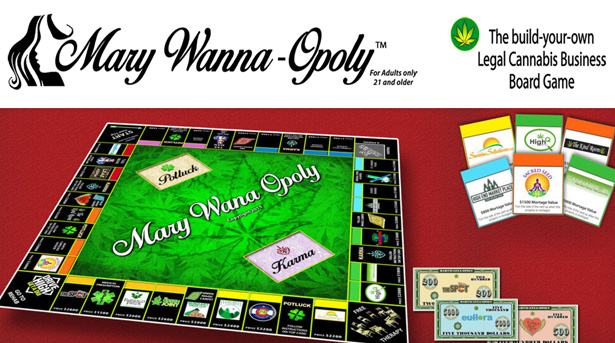
Mary Wanna-Opoly
Entrepreneur Randy Cooper is doing what good entrepreneurs do: marrying emerging national trends with Americans’ insatiable desire to have fun.
The result is Marywanna-opoly, a cannabis-themed board game -- modeled on the classic Monopoly game -- in which players wheel and deal to purchase not houses and hotels, but weed stores and weed farms.
Phoenix-based Cooper came up with the idea after seven years spent publishing maps in Colorado called Marywanna-Maps, which he sold to the state’s recreational dispensaries. “It’s not a map of every single dispensary in Denver,” he notes. “They pay to advertise. We can customize the game to promote your company’s name or brand. So their name is not only on the game, but also on the Weed Deed cards.”
Marywanna-opoly, which retailers for $40, went on the market this past December. Cannabis aficionados and game lovers can buy it online at www.Marywanna-opoly.com and at the dispensaries, as well as at a network of retailer stores that Cooper is now hard at work cobbling together.
‘POT RUSH’
Cooper, 65, says his involvement in the growing cannabis
business was a relatively recent move in his career. “I’ve always
been an entrepreneur, and only got interested in this industry as
a result of seeing the CNBC special a couple of years ago about
America’s pot rush. When (correspondent) Harry Smith said that
half of Colorado’s business was from tourists, I figured they might
need a map.”
Indeed, as Smith said of Colorado in his Marijuana in America special report, “The scent of money is in the air…. Once, prospectors came here looking for silver and gold. This bonanza is different. And everyone is seeing green.”
The first point in Cooper’s favor is that no one needs to be sold on the game’s concept. “Who’s not familiar with the world’s bestselling board game, Monopoly? There is no patent on Monopoly; the Supreme Court overturned it decades ago.”
The cannabis theme makes the classic game both timely and socially relevant. He insists, however, that his interest in it is strictly commercial, not ideological. While teaching people about cannabis and furthering the industry political agenda may be laudable goals, he says, “I’m just a true capitalist. It’s just designed to have fun with.”
Cooper agrees that the legalization movement has captured American’s attention. “Quite simply, the hardest thing in the world is to get two out of three people to agree on anything. And as people are well aware, what has made recreational feasible is the medical marijuana. It seems like it has touched everybody in American. Everyone knows someone who is suffering greatly and finding relief through medical marijuana.”
Based on everything that he has read, Cooper adds, it is medical marijuana that has made the entire concept of legal marijuana more socially acceptable. “In Florida, it failed to pass because it required a 60% majority. It had a majority, but only of 58%, so it just missed. The growth has its own course of acceptance; usually, medical leads recreational. But you know, the fact is that there are several states that have already legalized it, and the governor of Colorado (John Hickenlooper) said after a year in that ‘It’s not nearly as vexing as we thought.’”
Cooper sees no signs that the legalization process is going to stop; in fact, just the opposite. “I think that it is still going to take 10 or 15 years, but yes, it’s on its course.” He adds that he has “no doubt” that the industry is here to stay. Those who read B2B Wholesaler Magazine “already know that, and they’re all correct about the tremendous growth.”
As Cooper likes to point out, “Monopoly quit using money. We are traditional, with the bi-fold boards instead of a quad-fold, and we’ll always use money. We are not going to go to the ATM (which Monopoly now uses), so it has really become quite a collector’s item. Those are two major things.”
Marketing the game thus far, Cooper concedes, has been a challenge. “We are doing some trade shows, like Champs (the 17-year-old premiere B2B convention for the counter culture industry) and ASD (the leading retail merchandise event for consumer goods to be held this summer in Las Vegas). And I’m waiting to get on Amazon; I’m looking for experts to help me with that opportunity.”
He would also like to begin working on ways to use the game at parties and perhaps tournaments, as with classic Monopoly,“and what is trending is that there are cafes that are opening up specifically to play board games. In Sedona, AZ, where I publish a map we have a New Age store that is selling them, and it is doing well just because it is so novel and unique.”
‘A VERY HUGE THING’
The game, which targets everyone from kids to seniors, is fully
regulation-compliant and socially responsible.
“The state of Colorado gave us permission to use their Drive
High, Get a DUI campaign,” he explains. Colorado, the first
state with legal recreational marijuana, rolled out public service
announcements warning marijuana users about stoned driving.
The Drive High, Get a DUI campaign to which he refers came
from the state’s Department of Transportation, taking the form
of a trio of television commercials. The ads appear during shows
that target men ages 21 to 34, the demographic that tends to have
the highest number of DUIs.
“The lesson learned in Colorado is that you can’t use anything to market to kids,” Cooper adds. “That’s a very huge thing. There is a game out there now that uses cartoon images to encourage players to take tokes as part of the game, kind of like a drinking game. We are well aware of what you have to do to be compliant, so we are customizable, collectible and regulation-compliant.” And fun.
